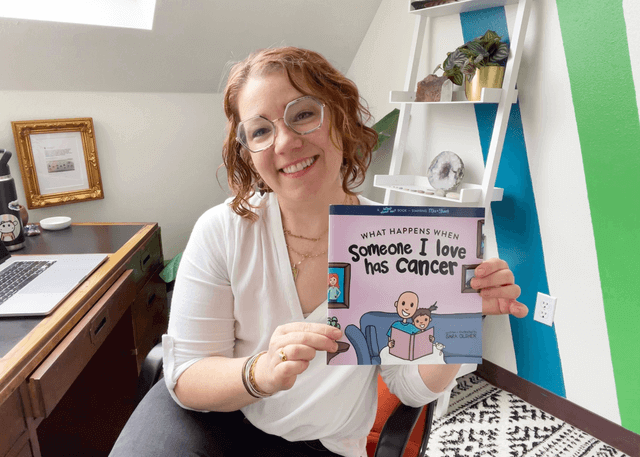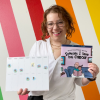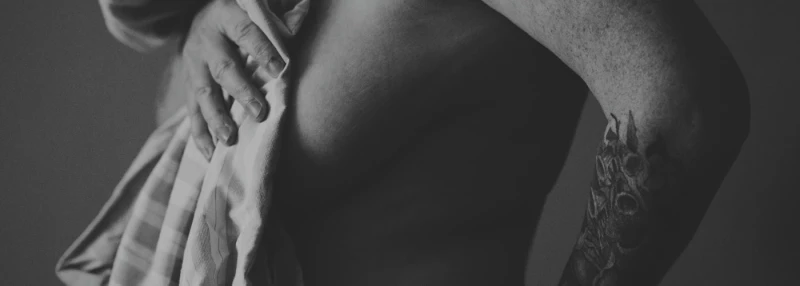If you’re reading this, you probably know what it’s like to have your entire life upended with one doctor’s appointment.
When I was diagnosed with breast cancer, I was 34 and the single parent to a six year old. My doctor handed me a booklet titled, “A Woman’s Guide to Breast Cancer Treatment,” and sent me on my way.
This booklet, meant (I think) to answer commonly asked questions about my new diagnosis, mentioned absolutely nothing about the #1 thing I cared about the most: my child.
As young women with cancer, to avoid the conversation of parenting and fertility is to miss an enormous part of what matters to many of us. It’s one of the main reasons general breast cancer support groups filled with grandmothers can feel so isolating, and a huge reason we need organizations like YSC.
At the 2018 YSC Summit, I realized just how many of us were moms when I saw other women scouring the exhibitor tables for kid-friendly souvenirs to take home, just as I was. It was at the Summit that I realized the huge, gaping hole for kid-friendly resources — and that I wanted to be the one to provide them.
With my background in psychology I was intimately familiar with how to talk to kids about hard things and how to help them cope through a parent’s long treatment. Here are a few of my most important tips:
An Ongoing Conversation
Many of us reach for a book when we’re faced with explaining something difficult to our kids, and cancer is no exception. I ended up writing my own children’s book, What Happens When Someone I Love Has Cancer, because the books I ordered didn’t actually explain what cancer is. I also wrote a free guide to explain cancer to kids to help with this initial conversation.
But having this conversation — arguably the worst conversation ever — is just the beginning, and it’s where pretty much every resource online stops. Once we’ve explained what cancer is (and that we have it) what happens next?
Kids need to understand that we expect them to have more questions as time goes on. More worries that need airing out. More complicated feelings, including anger, sadness, and guilt, that need processing. They need to be reminded that cancer is not a taboo subject, and that they can ask questions and share their fears any time they come up.
The great thing about books is that they can be referenced over and over again, which is essential for truly understanding a topic. In addition to talking about cancer in front of them and periodically checking in,, leave the book around as a reminder for them to page through it and talk about their concerns.
Staying Connected + Taming the Chaos
During my year-long treatment, chemo often left me so mentally out of it that I would find myself staring into space, not sure if I’d even had a thought for the last half hour. I was exhausted and worried that my daughter could sense that my mind was somewhere else.
As a single parent, my daughter and I are incredibly close. I am her person, and staying emotionally connected to her was one of my top priorities — second only to surviving.
When my treatment was over, I realized that it would have helped me a lot to have a list of easy things to do together so that my daughter could choose an activity. At times I’d have her paint my nails, or we’d watch YouTube together, or we’d make friendship bracelets together. But coming up with those ideas exhausted me, let alone doing them.
I highly suggest creating a calendar for cancer treatment that belongs to your child. You can use the calendar to show your kids what to expect each day — from who is doing school drop-off and pick-up to what treatments you’re having — which will seriously help any anxiety they might be having. On top of this, you can have them choose from a list of low-key activities to do together and put them on the calendar, which will give them something to look forward to. Just make sure to set a timer for 15 minutes so you don’t get exhausted by the activity. I desperately wish that I’d had this idea during my own treatment!
One thing I did do right was Special Time. For 15 minutes before bedtime, my daughter and I hung out in my bed cuddling, reading, or talking — she got to choose what we did. She really looked forward to Special Time, and often used it as an opportunity to tell me about her day or share things that were worrying her.
The Power of a Village
One thing I didn’t anticipate was that my second grader wouldn’t share all of her worries with me. I had been a single parent for the vast majority of her life, and I thought she would share everything with me.
To my surprise, she shared her feelings with my mom, who practically moved in with us during my treatment, and with my boyfriend. Even young kids want to protect their parents, and having other trusted adults around gives them an opportunity to share their feelings in a way that makes them feel comfortable.
Accepting help, as it turned out, didn’t only make life easier for me. It made life easier for my daughter, who needed more adults to trust and talk to.
Many cancer survivors I talk to — especially single parents, who like me, are used to doing everything on their own — are really hesitant to accept help for a variety of reasons. Opening myself up in this way was one of the hardest things I’ve ever had to do, but was also one of the most rewarding. It restored my faith in humanity and provided my daughter with a support network that has been truly invaluable.
Many of us worry about whether our kids will be okay after dealing with our cancer diagnosis, but the truth is this: No one gets out of life without facing hardship. Life is difficult, and as much as we’d love to protect them from it, all of our kids will face something hard in their lives.
The good news is that our kids are learning to face hardship with you there to hold their hand. You’re resilient, and you’re raising resilient kids. Good job.
 As a writer, illustrator, and speaker, Sara Olsher spends her life creating book and visual calendar kits for kids at Mighty + Bright and talking about things that make many people want to crawl into a deep, dark hole. Whether it’s divorce, cancer, death, or uncertainty, she's worked hard to be comfortable with the profoundly uncomfortable. Her work has been featured in POPSUGAR, Romper, Reader’s Digest, the Mighty, and Good Housekeeping, to name a few, and she's spoken in front of audiences large and small about how to handle major life changes like divorce and cancer. She truly believes that every one of us has the strength and resilience to overcome unimaginable hardship, and use our lessons to make this world a much better place. She is the author of six children's books about divorce and cancer, and other changes.
As a writer, illustrator, and speaker, Sara Olsher spends her life creating book and visual calendar kits for kids at Mighty + Bright and talking about things that make many people want to crawl into a deep, dark hole. Whether it’s divorce, cancer, death, or uncertainty, she's worked hard to be comfortable with the profoundly uncomfortable. Her work has been featured in POPSUGAR, Romper, Reader’s Digest, the Mighty, and Good Housekeeping, to name a few, and she's spoken in front of audiences large and small about how to handle major life changes like divorce and cancer. She truly believes that every one of us has the strength and resilience to overcome unimaginable hardship, and use our lessons to make this world a much better place. She is the author of six children's books about divorce and cancer, and other changes.




